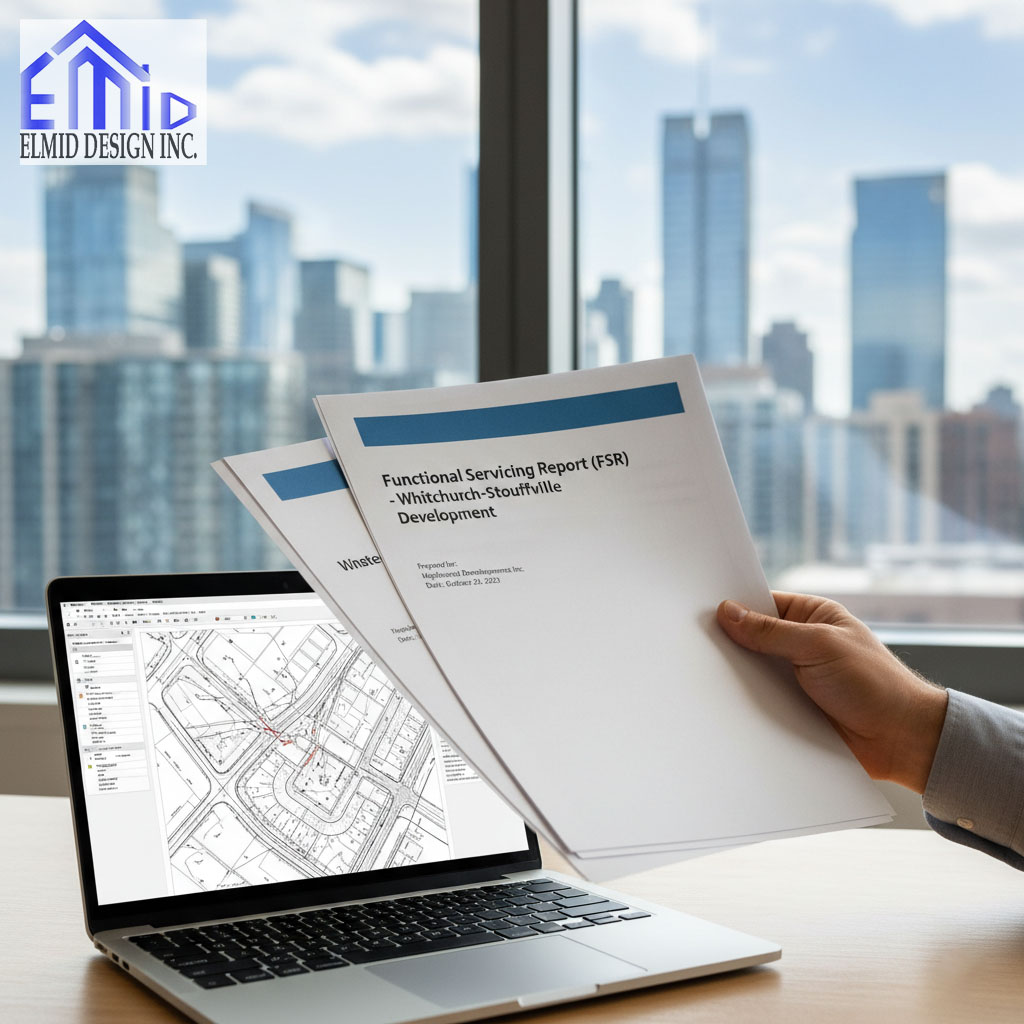A Functional Servicing Report Whitchurch-Stouffville is one of the most important documents in any land development project in this fast-growing Ontario community. It outlines how water, sanitary, and stormwater systems will support a proposed development while protecting municipal infrastructure and the environment. In Whitchurch-Stouffville, these reports are mandatory for most planning applications, ensuring that every new project is engineered safely and efficiently. This guide explains the purpose, process, and local context behind functional servicing, showing how professional engineering firms like Elmid Design Inc deliver technically sound and regulation-compliant solutions for developers and property owners.
Key Takeaways
A Functional Servicing Report (FSR) confirms that a development can be properly serviced by municipal systems. It includes detailed evaluations of water, sanitary, and stormwater infrastructure. In Whitchurch-Stouffville, the Town and York Region require an FSR before approving new subdivisions or site plans. An experienced, licensed engineering firm such as Elmid Design Inc ensures all design standards, calculations, and local requirements are met with precision and accountability.
Why a Functional Servicing Report Matters in Whitchurch-Stouffville
Whitchurch-Stouffville has seen steady residential and commercial growth, which places new demand on existing municipal systems. A Functional Servicing Report ensures that each project connects safely to water, sanitary, and storm infrastructure without overloading the system. It protects both the municipality and the developer by demonstrating that the design meets capacity, environmental, and regulatory criteria. Without a proper FSR, approvals can be delayed or denied, leading to costly redesigns and project setbacks.
Understanding What a Functional Servicing Report Is
A Functional Servicing Report is a conceptual engineering study that evaluates the feasibility of providing essential municipal services to a new development. It determines whether there is adequate capacity for water supply, wastewater conveyance, and stormwater control. The FSR provides engineering justification that the site can be safely developed according to municipal and provincial standards. It bridges planning and design by showing that servicing solutions are practical before detailed construction drawings are prepared.
The Role of Stormwater Management in a Functional Servicing Report
Stormwater management forms a significant portion of every Functional Servicing Report in Whitchurch-Stouffville. It involves evaluating how rainfall and runoff will be handled after development. The design must prevent flooding, control erosion, and protect downstream watercourses. Engineers analyze both quantity and quality controls, ensuring that peak flows are limited and contaminants are minimized. Local standards often follow provincial guidelines that require on-site detention, oil-grit separation, and proper erosion control measures to preserve local water quality.
Municipal and Regulatory Context in Whitchurch-Stouffville
The Town of Whitchurch-Stouffville requires all major planning applications to include a Functional Servicing Report. It must comply with local design criteria, York Region standards, and guidelines from conservation authorities such as the Lake Simcoe Region Conservation Authority. The FSR ensures that proposed connections align with the Town’s water and wastewater master plans and that stormwater systems meet environmental protection goals. Municipal engineers review these reports to confirm compatibility with future infrastructure planning and growth management.
Components of a Functional Servicing Report in Whitchurch-Stouffville
An FSR typically includes analysis of the existing municipal network, proposed servicing layouts, and calculations for water, sanitary, and storm systems. It covers grading, drainage, and erosion control strategies. Each system is modeled for capacity and performance during design storms or peak flows. Water servicing evaluates pressure, fire flow, and connection points. Sanitary servicing reviews pipe sizes, slopes, and flow rates. Stormwater management examines runoff control and water balance. Together, these sections ensure the site functions safely and sustainably.
Case Study: Functional Servicing Report for 5688 Main Street
A practical example of a Functional Servicing Report in Whitchurch-Stouffville is the one prepared for a mixed-use development at 5688 Main Street. The study analyzed existing municipal connections and proposed upgrades to handle increased demand. It included watermain connections, sanitary sewers, and underground stormwater storage with flow control structures. The design balanced post-development runoff with pre-development conditions. The report also demonstrated compliance with fire flow and environmental standards, ensuring a reliable and sustainable servicing solution.
Common Challenges in Functional Servicing Reports for Whitchurch-Stouffville
Preparing a Functional Servicing Report in Whitchurch-Stouffville can present several challenges. High groundwater levels, limited downstream capacity, and multiple agency approvals often complicate design. Engineers must also coordinate with the Town, Region, and conservation authorities to align criteria and expectations. Managing stormwater in dense urban infill areas requires innovative solutions such as underground storage or low impact development practices. Firms like Elmid Design Inc apply advanced modelling and local knowledge to navigate these challenges effectively.
Importance of Working with Licensed Professional Engineers
Because a Functional Servicing Report involves public infrastructure and environmental impacts, it must be prepared and stamped by a licensed professional engineer. In Ontario, this requirement ensures technical accuracy and accountability. Elmid Design Inc, holding a Certificate of Authorization from Professional Engineers Ontario (PEO), provides engineering services that meet regulatory standards and ethical obligations. Their team prepares detailed, defensible reports that satisfy municipal reviewers and reduce risks for developers during the approval process.

Methodologies and Calculations in Functional Servicing Reports
A Functional Servicing Report Whitchurch-Stouffville relies on detailed engineering methods to prove that proposed servicing systems can handle new demands. Engineers calculate stormwater runoff using hydrologic models that simulate rainfall, infiltration, and storage conditions. Water supply analysis evaluates pressure zones and fire flow capacity, while sanitary design uses peak flow equations to determine pipe sizing. Each calculation must align with municipal design manuals and provincial standards. Clear documentation of these assumptions allows Town engineers to verify that servicing proposals will perform as expected under future growth conditions.
Stormwater Management Techniques in Whitchurch-Stouffville
Stormwater management is a central part of every Functional Servicing Report within Whitchurch-Stouffville’s growing developments. Engineers use modern techniques to control runoff and reduce pollution. Underground storage chambers and oil-grit separators are common for managing quantity and quality. In areas with limited space, on-site vaults and flow restrictors help mimic natural drainage patterns. These systems protect downstream creeks and municipal infrastructure by reducing peak flows and improving water quality. Sustainable solutions are encouraged, ensuring long-term environmental balance across the community.
Sanitary Design and Demand Estimation
In a Functional Servicing Report, the sanitary servicing section examines how wastewater from a proposed site connects to existing municipal sewers. Engineers estimate base sanitary flows and apply peaking factors to predict maximum daily demands. The goal is to confirm that downstream pipes and pumping stations have enough capacity to handle new connections. Proper slope design prevents blockages and ensures efficient gravity flow. In Whitchurch-Stouffville, careful coordination with York Region is necessary because regional trunk sewers often serve multiple developments sharing the same system.
Water Servicing and Fire Flow Design
The water servicing component of a Functional Servicing Report demonstrates that a project can connect to the Town’s existing water network safely. Engineers evaluate domestic and fire flow requirements, using hydrant tests to verify available pressures. Design calculations ensure that peak hour and maximum day demands can be met without reducing residual pressure below municipal standards. In Whitchurch-Stouffville, fire protection is a critical factor because new developments must maintain adequate flow for firefighting. Licensed firms such as Elmid Design Inc prepare these analyses in accordance with Professional Engineers Ontario requirements, ensuring precision and safety.
Integrating Functional Servicing Reports with Municipal Master Plans
Each Functional Servicing Report Whitchurch-Stouffville must align with the Town’s current and future master plans for water, wastewater, and stormwater systems. These plans outline where growth will occur and how infrastructure will expand to support it. Therefore, an FSR that follows these objectives not only reduces the need for future upgrades but also prevents potential capacity conflicts. Moreover, coordination with the Town and York Region ensures that proposed servicing connections match approved planning frameworks. As a result, this alignment promotes sustainable growth, encourages better communication among stakeholders, and helps developers move projects forward with fewer revisions and delays.
Review Process and Common Pitfalls
After submission, the Functional Servicing Report undergoes detailed municipal review. Town engineers and external agencies verify calculations, model results, and design compliance. Many reports face delays due to missing data, unclear assumptions, or uncoordinated servicing strategies. Early communication with municipal staff and conservation authorities often prevents these issues. A clear, concise report supported by defensible calculations is more likely to receive timely approval. Elmid Design Inc emphasizes quality control throughout this process, ensuring every report meets both technical and administrative expectations.
Advanced Engineering Practices in Functional Servicing Reports
Modern Functional Servicing Reports in Whitchurch-Stouffville incorporate advanced design and modeling tools that improve accuracy and efficiency. Engineers now use dynamic hydrologic models to predict how rainfall interacts with soil, surfaces, and storage systems. These models help assess storm events of different magnitudes and durations, ensuring that runoff volumes remain within acceptable limits. Software applications allow real-time adjustment of pipe sizes, slopes, and control structures, producing reliable results quickly. Elmid Design Inc applies these tools to ensure that every Functional Servicing Report meets the technical standards required by municipal and provincial guidelines while optimizing the design for constructability and long-term maintenance.
Integration of Low Impact Development Strategies
Low Impact Development, or LID, is becoming a crucial part of stormwater management in Whitchurch-Stouffville. Functional Servicing Reports now include LID features to mimic natural hydrology and promote infiltration. Techniques such as bio-swales, rain gardens, and permeable pavements reduce runoff at the source, helping balance the local water table. Incorporating LID improves the environmental sustainability of new developments and aligns with Town goals for water quality and flood protection. Elmid Design Inc integrates LID into FSRs where feasible, ensuring compliance with the Lake Simcoe Region Conservation Authority’s water balance requirements and the Town’s design objectives.
Coordination with Multi-Level Government Requirements
Whitchurch-Stouffville developments must comply with both municipal and regional servicing policies. A Functional Servicing Report bridges these regulatory layers by aligning design concepts with York Region and provincial infrastructure plans. This coordination avoids duplication and prevents capacity conflicts across shared systems. Engineers must confirm that local connections do not exceed regional capacity thresholds for water and sanitary services. Reports that demonstrate strong alignment across jurisdictions build confidence with reviewers and support faster approvals. Elmid Design Inc maintains close communication with both Town and Region officials to ensure every report aligns with the latest infrastructure priorities.
Environmental and Sustainability Considerations
Sustainability now drives many decisions in Functional Servicing Report preparation. Whitchurch-Stouffville emphasizes protection of groundwater recharge areas, control of pollutants, and reduction of long-term maintenance demands. Engineers evaluate soil conditions, drainage patterns, and downstream sensitivities before recommending servicing solutions. Designs that reduce impervious area and promote natural infiltration achieve better results and improve municipal resilience. Sustainable approaches also extend infrastructure life and reduce lifecycle costs for property owners and the municipality. Elmid Design Inc applies sustainability principles to balance functionality, compliance, and environmental stewardship in every report.
Data-Driven Decision Making in Servicing Design
Data plays a vital role in shaping the conclusions of a Functional Servicing Report. Modern engineering relies on Geographic Information Systems and flow monitoring data to model existing municipal systems accurately. By comparing simulated results with field measurements, engineers can identify capacity constraints and design appropriate solutions. Data-driven reporting also enhances transparency during municipal review because decisions are based on measurable performance indicators. As Whitchurch-Stouffville continues to grow, dependable data will remain critical for ensuring that servicing networks can accommodate future developments safely and efficiently.
Role of Professional Certification and Accountability
Every Functional Servicing Report must be signed and sealed by a professional engineer authorized under Ontario law. This requirement ensures that all technical conclusions carry professional accountability and conform to engineering ethics. Firms such as Elmid Design Inc, with a Certificate of Authorization from Professional Engineers Ontario, are trusted to deliver reports that meet these obligations. Their certification provides assurance that calculations, assumptions, and recommendations are technically valid and reviewed for accuracy. This professional oversight reinforces the Town’s confidence in approving developments that depend on complex servicing systems.
Economic and Development Benefits of High-Quality Reports
A well-prepared Functional Servicing Report benefits both developers and the municipality by reducing delays and minimizing costly redesigns. Detailed servicing analyses clarify how each project connects to existing infrastructure and what upgrades may be required. When an FSR addresses capacity and compliance early, the overall approval timeline shortens, allowing construction to proceed sooner. For Whitchurch-Stouffville, this efficiency supports economic growth while ensuring responsible development. Elmid Design Inc focuses on producing technically sound and clearly documented reports that simplify coordination and reduce uncertainty for all project stakeholders.
Future Trends in Functional Servicing Report Preparation
The future of Functional Servicing Reports in Whitchurch-Stouffville will include digital submissions, real-time modeling, and integration with municipal asset management systems. Climate change will influence design rainfall data and increase the need for adaptive stormwater infrastructure. More emphasis will be placed on green technologies, water reuse, and decentralized systems. Data integration between developers, consultants, and the Town will enhance transparency and accelerate the review process. Firms such as Elmid Design Inc continue to evolve their methods to align with these trends, ensuring that new developments remain sustainable and resilient under changing environmental conditions.
Recommendations for Effective Functional Servicing Reports
Developers and engineers should treat the Functional Servicing Report as a collaborative planning tool rather than a checklist document. Early engagement with the Town and utility providers helps refine servicing strategies before detailed design. Accurate surveys and up-to-date base data are essential for realistic calculations. Reports must present results logically, with clear reasoning behind each design choice. In Whitchurch-Stouffville, a well-prepared FSR supports efficient municipal review and demonstrates professional accountability, reflecting the expertise and reliability of qualified firms like Elmid Design Inc.
Future of Functional Servicing Reports in Whitchurch-Stouffville
The need for functional servicing reports will continue to grow as Whitchurch-Stouffville expands. Climate change, aging infrastructure, and evolving stormwater regulations will influence future engineering standards. Low impact development and green infrastructure will play larger roles in managing runoff sustainably. Future FSRs will combine data analytics and modeling to optimize designs and reduce construction costs. This evolution supports the Town’s commitment to responsible development and environmental stewardship while maintaining infrastructure resilience for future generations.
Frequently Asked Questions about Functional Servicing Reports
What is the difference between a Functional Servicing Report and a detailed design?
A Functional Servicing Report provides a conceptual engineering framework demonstrating that proposed servicing is feasible. A detailed design translates those concepts into final construction drawings and specifications.
When is a Functional Servicing Report required in Whitchurch-Stouffville?
The Town requires an FSR for most planning applications, including site plan, subdivision, and rezoning submissions, to confirm that the development can be serviced by existing or proposed municipal systems.
Who prepares and reviews a Functional Servicing Report?
Licensed professional engineers prepare the report, and the Town of Whitchurch-Stouffville, York Region, and relevant conservation authorities review it for compliance with standards and capacity limits.
How does an FSR influence development approvals?
An accurate FSR accelerates approvals by addressing municipal servicing and environmental requirements early in the process. Incomplete or inaccurate reports often delay review and add unnecessary costs.
Why should developers work with certified firms?
Working with a PEO-authorized engineering firm such as Elmid Design Inc ensures compliance, reliability, and accountability in every stage of the Functional Servicing Report process, supporting successful project approvals in Whitchurch-Stouffville.

Expert Functional Servicing Report Consultants – Elmid Design Inc
Elmid Design Inc is a professional engineering firm authorized by Professional Engineers Ontario (PEO) to provide civil and municipal design services across Ontario. The company specializes in preparing precise Functional Servicing Reports, Stormwater Management Plans, and Site Servicing Designs for residential, commercial, and industrial developments. With a commitment to accuracy, sustainability, and compliance, Elmid Design Inc delivers innovative engineering solutions that meet municipal and environmental standards. Its reputation for technical excellence and reliability makes it a trusted partner for developers seeking expert guidance in Whitchurch-Stouffville and beyond.
Geographic Locations That We Service:
Our Licensed Professional Engineers specializing in Engineered Site Grading Plans offer the best-engineered site grading plan, lot grading and erosion plan, and drainage plan to obtain site plan approval and building permits in Ontario, including a wide range of municipalities. Each area boasts unique features and requirements, making our tailored approach essential for success.
Toronto and Surrounding Areas
In the vibrant heart of Ontario, we service Toronto (City of Toronto) and surrounding areas. Additionally, we cover Oshawa (City of Oshawa), Pickering (City of Pickering), and Clarington (Municipality of Clarington). Furthermore, our expertise extends to Ajax (Town of Ajax), Whitby (Town of Whitby), Brock (Township of Brock), Scugog (Township of Scugog), and Uxbridge (Township of Uxbridge).
Halton Region
Moving to the Halton Region, our services encompass Burlington (City of Burlington) and Halton Hills (Town of Halton Hills). Also included are Milton (Town of Milton) and Oakville (Town of Oakville).
Peel Region
In the Peel Region, we provide services in Brampton (City of Brampton), Mississauga (City of Mississauga), and Caledon (Town of Caledon).
York Region
Our services in the York Region cover Vaughan (City of Vaughan), Aurora (Town of Aurora), and East Gwillimbury (Town of East Gwillimbury). We also cater to Georgina (Town of Georgina), Markham (City of Markham), Newmarket (Town of Newmarket), Richmond Hill (City of Richmond Hill), Whitchurch-Stouffville (Town of Whitchurch-Stouffville), King (Township of King), and Bradford-West Gwillimbury (Town of Bradford-West Gwillimbury). Each municipality here offers a distinct setting, requiring our specialized approach.
Other Southern Ontario Cities and Towns
We also serve many other cities and towns in Southern Ontario. These include Hamilton (City of Hamilton), St. Catharines (City of St. Catharines), Niagara on the Lake (Town of Niagara on the Lake), Brant (County of Brant), Cambridge (City of Cambridge), Kitchener (City of Kitchener), Waterloo (City of Waterloo), and Woodstock (City of Woodstock). Furthermore, we operate in Guelph (City of Guelph), Centre Wellington (Township of Centre Wellington), Shelburne (Town of Shelburne), Orangeville (Town of Orangeville), New Tecumseth (Town of New Tecumseth), Essa (Town of Essa), Collingwood (Town of Collingwood), Wasaga Beach (Town of Wasaga Beach), Barrie (City of Barrie), Midland (Town of Midland), Orillia (City of Orillia), Ramara (Town of Ramara), Minden Hills (Town of Minden Hills), North Kawartha (Town of North Kawartha), Kawartha Lakes (City of Kawartha Lakes), Peterborough (City of Peterborough), Selwyn (Town of Selwyn), and Brighton (Municipality of Brighton).




